17 Foods That Make Your Depression and Anxiety Worse
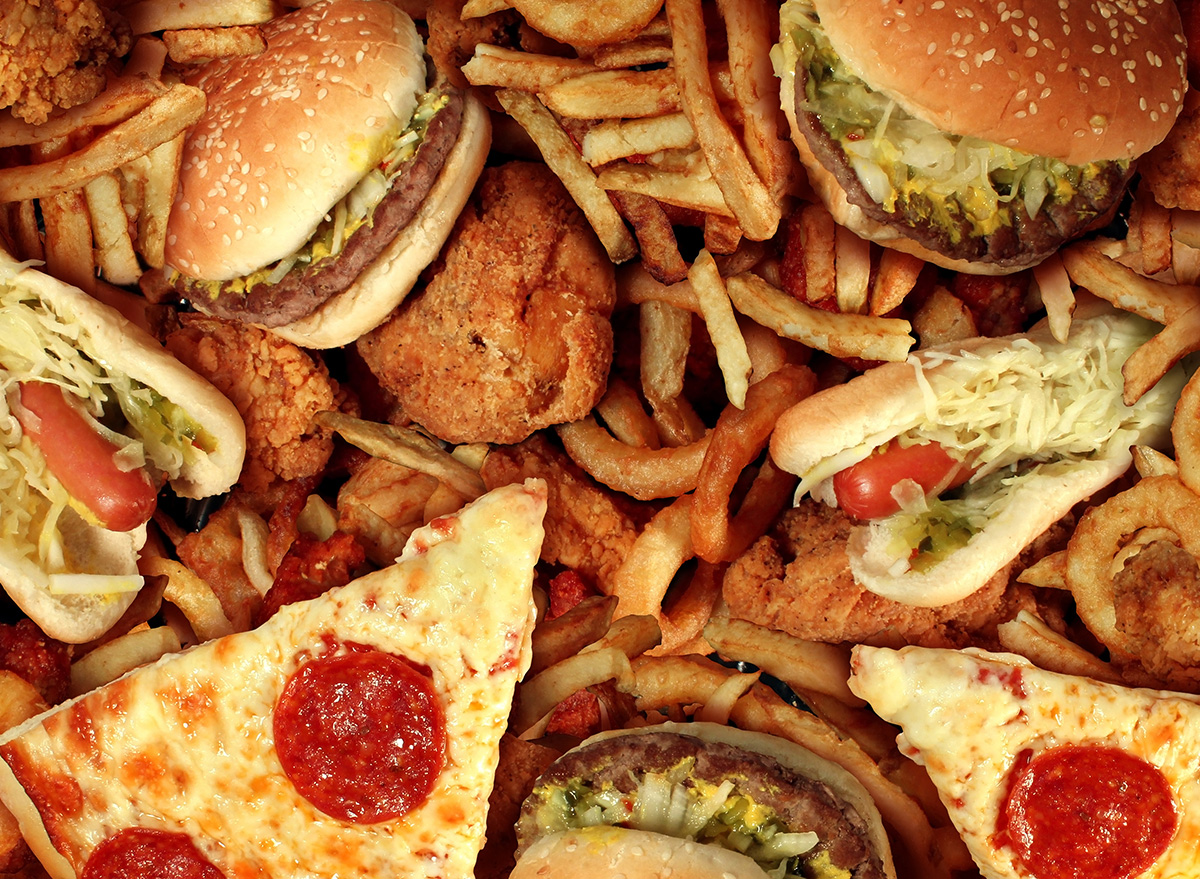
You already know that your emotions can influence what you eat. But what you may not realize is that what you eat can also dramatically alter your mental health. Seriously: some foods worsen anxiety and depression.
Simple food choices can make the difference between feeling worse and feeling more stable, says research from Harvard Health. Eighteen percent of the population suffers some form of anxiety disorder, and 6.7 percent of the American population over the age of 18 have been diagnosed with clinical depression, according to the Anxiety and Depression Association of America.
You don’t have to be officially diagnosed (many people aren’t, anyway) to know what an overwhelming burden it can be when you are even marginally anxious or depressed. And while the two aren’t necessarily inclusive of each other, we’ve chosen to focus on them together since we can all relate to how both conditions weigh us down.
The good news is that while there are plenty of potential causes for either situation, the foods we consume can play a major role in increasing the frequency, depth, and duration of bouts of depression or anxiety, especially if we’re already predisposed to experiencing them. Your best move is to familiarize yourself with some of the foods that have been repeatedly linked with doing more damage to your psyche—and then drastically reduce your consumption of them.
Want to know more about how
Foods That Make You More Depressed

Steer clear of these foods and ingredients that have been found to have a negative impact on your mood.
Sugar
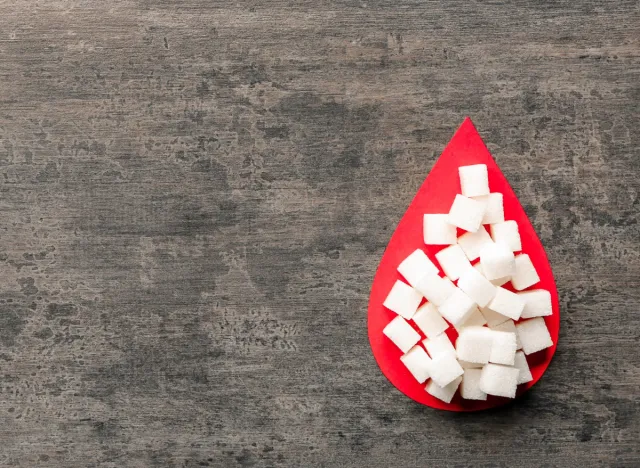
We despise sugar at Eat This, Not That! for a variety of reasons; its strong association with depression is just one. A 2015 study of postmenopausal women demonstrated that an increase in added sugars in their diet was associated with an increased likelihood of depression. In the past, scientists weren’t sure why depression, diabetes, and dementia seemed to cluster in epidemiological studies or why having one of these health issues increases your risk for the others. But in a study published the journal Diabetologia, researchers have found that when blood glucose levels are elevated, levels of a protein that encourages the growth of neurons and synapses drops. Translation: The simple act of eating sugar makes your brain work at a suboptimal level—and the more you do it, the greater your risk of depression and the greater your risk of diabetes and dementia, too. Want to know what foods to steer clear from? Get our list of 30 Sugariest Foods in America.
Artificial Sweeteners
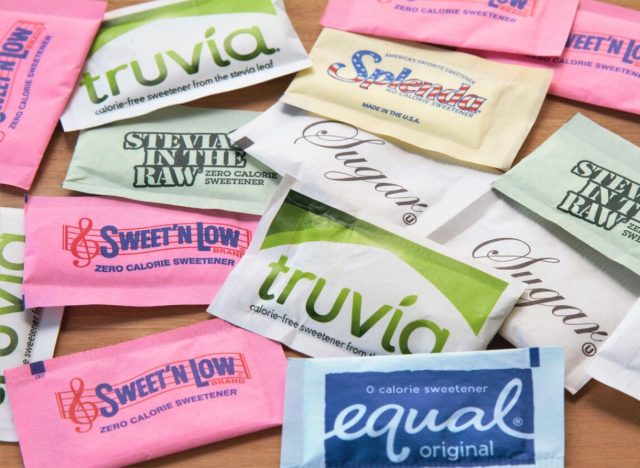
Don’t think that just because sugar is out that artificial sweeteners will enable you can humor your sweet tooth without elevating your risk of depression. Aspartame, the common (and dangerous) ingredient that’s found in products like diet soda, blocks the production of the neurotransmitter serotonin. This can cause all manner of neuro maladies including headaches, insomnia, changes in mood—and yes, depression. But it’s not just aspartame: NutraSweet or Equal may also be bad for your mental well-being. Read more about What Happens to Your Body When You Eat Artificial Sweeteners.
Alcohol
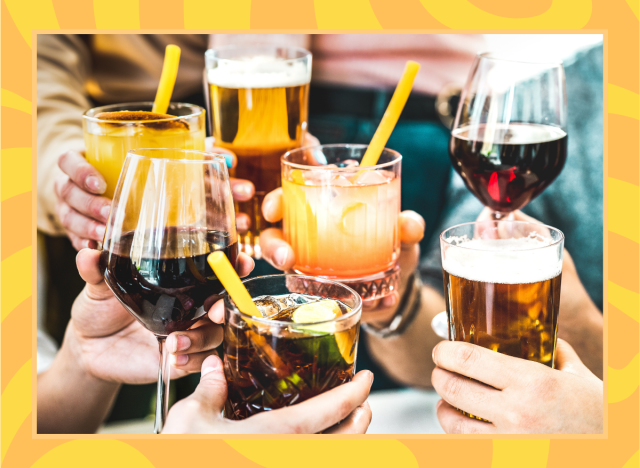
Your central nervous system is important, to put it lightly. It’s responsible for taking in information through the five senses, thinking, understanding, reasoning, and controlling motor function. You’ll note that all of these things are in scant supply as the night wears on at your local watering hole. That’s because alcohol is a depressant, and more specifically, depresses the working order of the central nervous system. Oh, and the central nervous system controls how we process emotions, too. Bottom line: Booze is a little too efficient at exacerbating symptoms associated with depression. If cut back on drinking, you may be amazed by What Happens To Your Body When You Give Up Alcohol.
Hydrogenated Oil
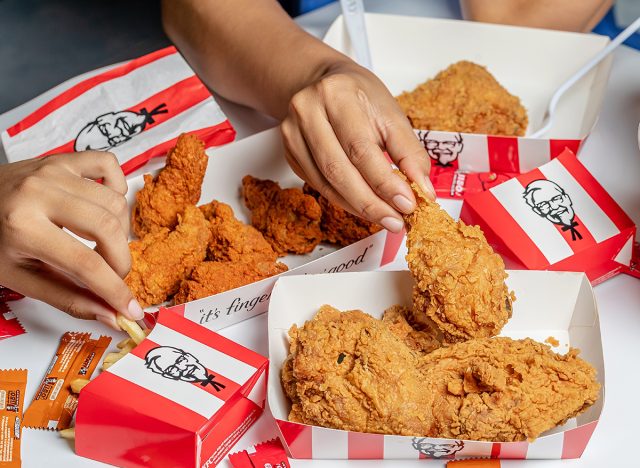
Fried chicken, fried cheese sticks, fried calamari, French fries. You won’t ever see these items marked as an “Eat This.” They cause trouble for your body for a variety of reasons and can negatively affect your weight. But there’s more: They’re also linked to depression. See, deep frying is usually done in partially hydrogenated oil. Hydrogenation is a process that turns vegetable oil into a more solid form, which makes it a more shelf-stable product. Anything that is cooked with hydrogenated oils and contains trans fats could potentially contribute to depression. Saturated fats, like the ones found in deli meats, high-fat dairy, and butter can clog arteries and prevent blood flow to the brain—and optimal brain function is what you want, if you’re trying to stave off the blues. To learn more about food that’s absolutely terrible for you, and how to make better choices while grocery shopping or eating out, sing up for our newsletter.
Fast Food
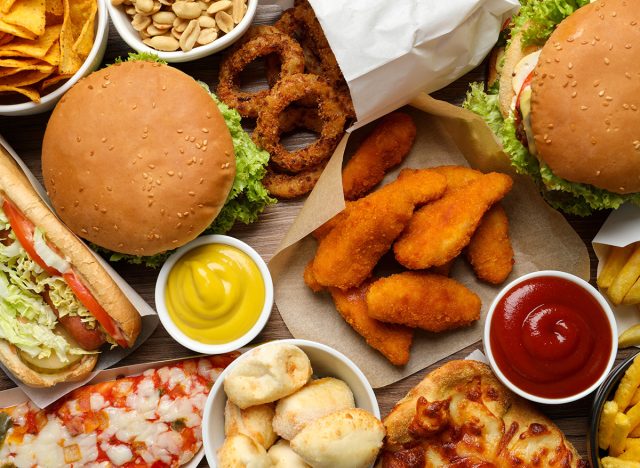
Cheap and easy? In the short term, kinda sorta. But once you factor in the changes it can make to your physical and mental well being, the true price of that cheap stuff gets steep real fast. According to a 2012 study in the journal Public Health Nutrition, people who eat fast food are 51 percent more likely to develop depression than those who don’t. To clarify: When we say fast food, we’re talking about hamburgers, hot dogs, pizza, and commercial baked goods. Eating a small portion of any one food is unlikely to raise depression risk, but if you see Ronald, Wendy, The Colonel or Popeye on a regular basis, a drastic dietary adjustment would be a great step toward happier feelings and less depression. Need more reason to quit? Learn more about 20 Things That Happen to Your Body When You Eat Fast Food.
Trans Fats
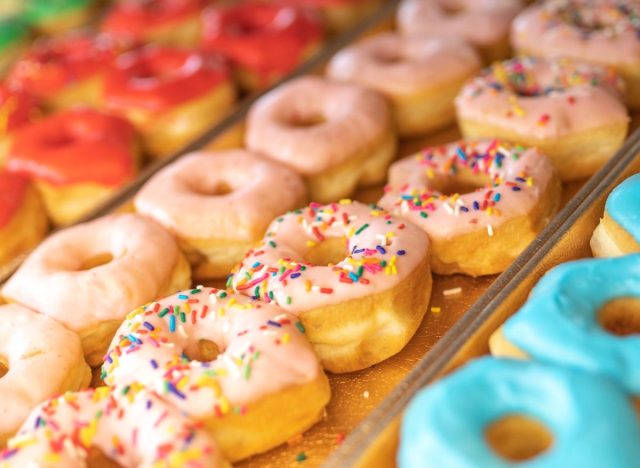
Trans fat is the name given to unsaturated fats that don’t usually occur in whole foods. Only in the 1950s did trans fats become commonly used in things like margarine, snack food, packaged baked goods, and oils used to fry fast food. Consuming artery-clogging trans fats can increase your risk of depression by as much as 48 percent, according to a study published in PLoS One. Conversely, plenty of studies have shown that a Mediterranean diet, which traditionally utilizes olive oil rather than trans fats, can lower the risk of numerous health conditions, including depression.
High-Sodium Foods
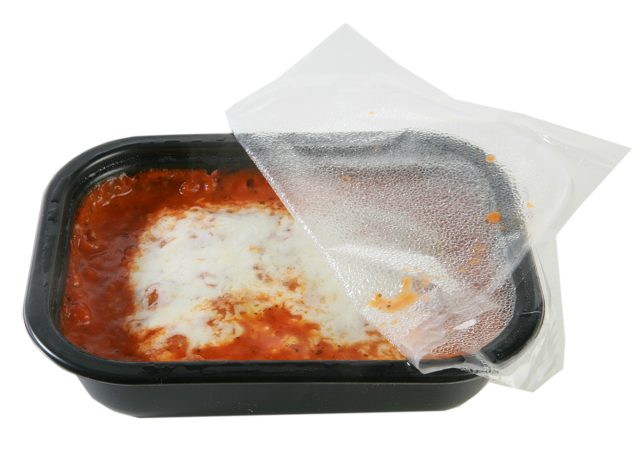
For decades, fat-free foods have been touted as being a weight loss solution—but many of these products contain mini mountains of sodium. Experts say that all that extra salt can totally futz with your emotions because the extra sodium in these products can disrupt aspects of your neurological system. Not only can this directly contribute to depression, but it can also monkey with your immune system response and cause fatigue. An over-taxed body is a way to invite disruption to your emotional state. And, of course, an excess of salt also leads to fluid retention and bloating. Like many of the foods on this list, salt can contribute to weight gain, resulting in a negative body image and snowballing depression even further. Get our list of 25 Foods High in Sodium You Should Watch Out For and 35 Saltiest Restaurant Meals on the Planet.
Caffeine
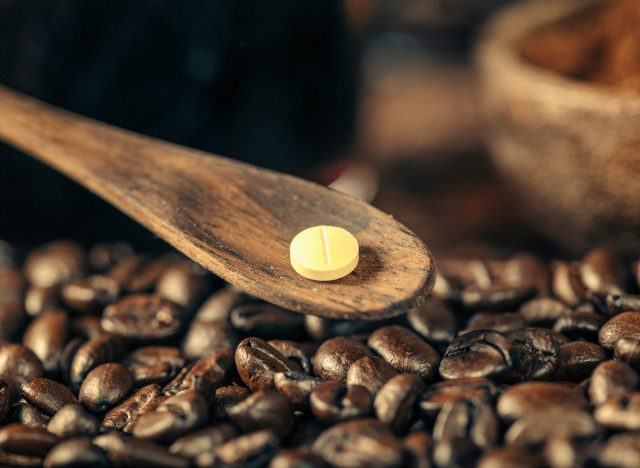
There are plenty of experts who will tell you that even a modest amount of caffeine can contribute to depression—and at least one study has found that, among healthy college students, moderate and high coffee drinkers scored higher on a depression scale than others. The reason most experts cite is caffeine’s disruptive effect on sleep. Coffee and black tea make it more difficult to fall asleep and to stay asleep. Sleep is connected to mood and disturbed sleep can seriously mess with your mental state. The one drink to avoid at all costs if you plan on going to bed any time in the next 24 hours? Energy drinks. Some types have the caffeine equivalent of 14 cans of soda.
Processed Foods

Processed foods are the perfect storm of several things that can be problematic to your overall health. They’re high in sodium and sugar, and pave the way for an inflammatory response in the body. As reported in an article by Psychiatric Times, the correlation between depression and inflammation has received a lot of attention in recent years, and although not every patient suffering from depression shows signs of inflammation in the body, studies have shown that inflammation has a direct effect on the brain and behavior. It can negatively affect the areas of the brain responsible for motivation and motor activity, as well as areas that control arousal, anxiety, and alarm. However, if you don’t want to cut processed foods out completely, here are 17 Processed Foods Nutritionists Approve Of.
Soy Sauce
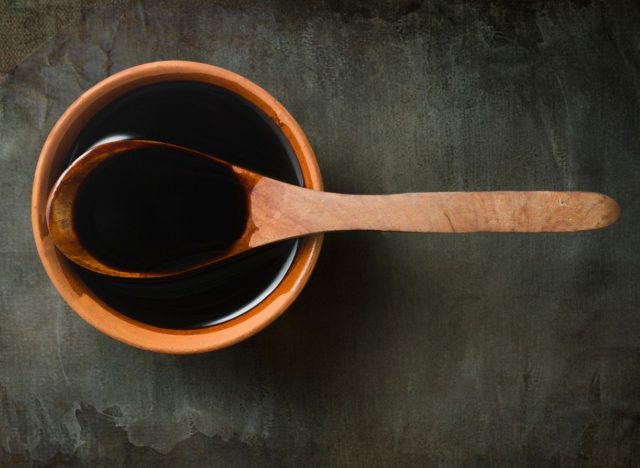
If you’re sensitive to gluten, soy sauce and other gluten-heavy products can really wreak havoc on your digestive system and overall health. We can only partially digest gluten, which can lead to gut irritation and immune and allergic reactions. And while gluten is a serious irritant akin to poison for those suffering from celiac disease, Psychology Today reports on some studies linking depression and gluten in patients who aren’t suffering from the condition. A 2012 study out of Oslo University Hospital showed that a group of human subjects that was consuming gluten after six weeks of a gluten-free diet reported 90% more depression as a result, compared to the control group that stayed gluten-free.
Foods That Make You More Anxious

Avoid these anxiety trigger foods and nourish away the nerves, one meal at a time.
Wheat Bran
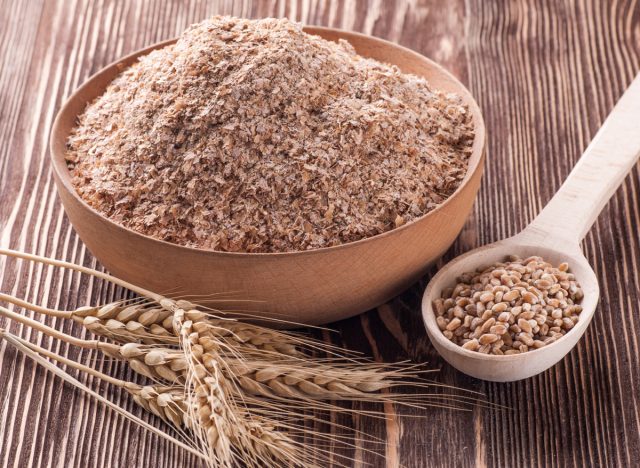
Touted by health experts and foodies for its impressive fiber content and complex, nutty flavor, wheat bran gets a black mark in the anti-anxiety department for its notoriously high concentration of phytic acid. This anti-nutrient binds to important mood minerals like zinc and limits their absorption. Adequate levels of zinc are especially important for anxious people, as deficiencies are common and have shown to induce anxious behavior and depression. Soaking and cooking can help reduce the anti-nutrient which is found primarily in whole grains and dried beans; so make the extra step a staple of your kitchen when preparing rice, oatmeal, soups, and stews.
Tofu

Soy is like that date who demands affection while refusing PDA and cuddling. Even though soy is packed with lean protein, it’s also packed with trypsin and protease inhibitors—enzymes that make the digestion of protein incredibly difficult. Soy is also high in copper, a mineral linked to anxious behavior, and loaded with oligosaccharides, which are known to cause flatulence. (Terrific for social anxiety…Just kidding.) Toss the processed tofu and veggie burgers, and if you must eat soy, stick to fermented varieties like tempeh and miso, which are easier to digest. If you’re vegan or vegetarian, learn How to Eat More Plant Protein If You Hate Tofu.
Coffee

That’ll be a grande latte and a venti panic attack? Coffee is like jet fuel for an anxious brain. It’s one of the highest concentrated dietary sources of caffeine, and research shows that people with social anxiety are particularly sensitive to feeling nervous side effects from just small amounts of the stimulant. Caffeine can also blunt the absorption of key mood-balancing nutrients like vitamin D and the B vitamins. When weaning off the jumpy stuff, naturally decaffeinated herbals teas, especially chamomile, can be a great alternative to coffee and may also provide meaningful antianxiety and antidepressant activity, research suggests.
Canned Soup
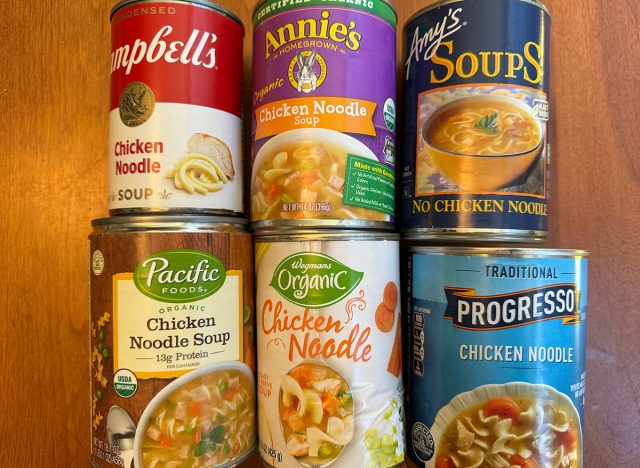
If grandma wouldn’t recognize it, cook with it, or enjoy eating it, get rid of it. That’s the basic nutrition advice from most anti-anxiety experts who recommend a traditional, whole foods diet. “I have my clients avoid processed foods at all costs,” explains certified nutritionist Trudy Scott, author of The Antianxiety Food Solution. “The foods you choose shouldn’t have labels; and if they do, they shouldn’t read like a chemistry experiment,” she adds. Even the packaging of “convenience” foods may be a cause for—and cause of—concern. Bisphenol A (BPA), a chemical used in most canned food liners and plastic containers, can throw off important mood-stabilizing neurotransmitters by significantly altering genes in the stress-mediating portion of the brain, research shows. A previous study found children exposed to BPA in early childhood were more likely to have anxiety issues, according to researchers at the University of California–Berkeley. Still love a good can of soup? Make sure you’re picking soups from our list of 14 Best Healthy Canned Soups and Soup Products.
Apple Juice
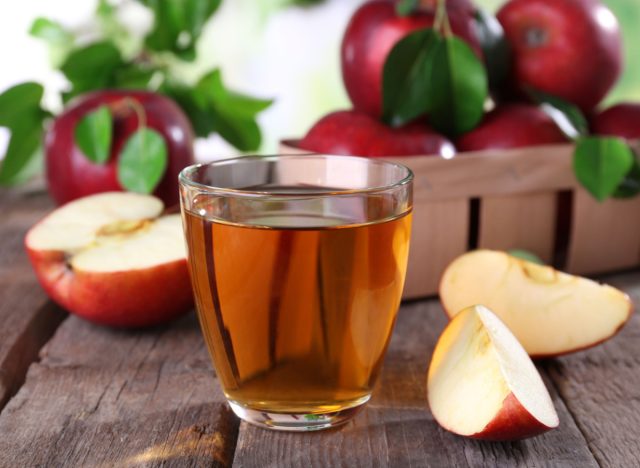
Things may have gone a little differently for Snow White had she been tricked by a witch with a glass of apple juice. She’d probably still pass out—but not before running around the house in a nervous panic. That’s because, unlike whole fruits, juices are devoid of slow-digesting fiber and loaded with refined fructose. The result is a blood sugar spike that triggers a rush of the stress hormone adrenaline, with symptoms that look a lot like a panic attack. In fact, a recent study showed fructose can alter how the brain responds to stress on a genetic level. What’s more, many apple juice brands have tested positive for arsenic — a toxin shown to induce anxious behavior and worsen depression. As a general rule, avoid all sweetened beverages. If water is boring to you, then try one of these detox waters instead!
Red Wine

Wine-ing down may only wind you up. While a glass of vino or beer may temporarily help to calm an anxious mind, research suggests the happy hour strategy may backfire long-term. People with anxiety disorders who self-medicate with alcohol or drugs were up to four times more likely to develop a dependency problem within three years than a group who skipped on self-medicating, according to a study in Alcohol Research Current Reviews. Even in the short-term, a few drinks can cause sleep problems, blood sugar swings, and dehydration—all things you want to avoid if you’re anxious. If you feel you “need” to drink, consider swapping your night-cap for a glutamine capsule. The amino acid has shown to reduce alcohol cravings and may be helpful while detoxing from it.
Fermented Foods
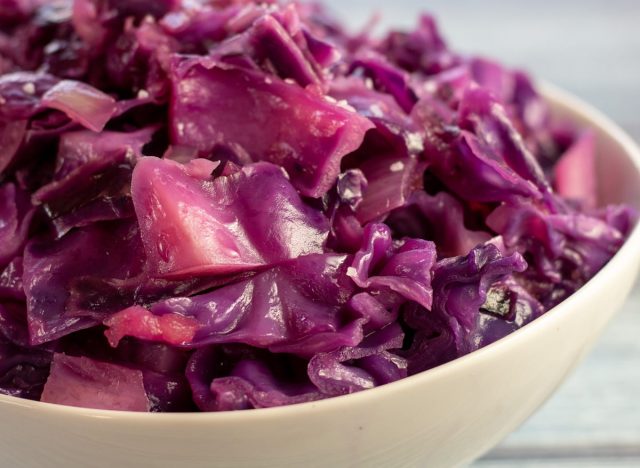
Fermented foods are really great for your gut health, but they may be linked to increased anxiety in people where no other clinical reason for anxiety and panic attacks exists. During the fermentation and aging process, the proteins in food are broken down, and one of the byproducts of this breakdown are histamines. An excess of histamines can feel like a panic attack in the body, especially if you have a sensitivity to it. Beyond that, high levels of histamine can cause brain inflammation that in turn causes anxiety.